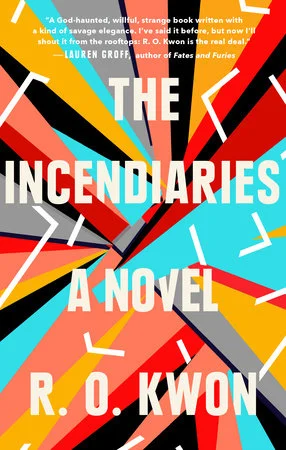A Conversation with R.O. Kwon on Fanatics and Debut Novels
by Nancy Hightower
R.O. Kwon’s The Incendiaries is a slim, lyrical exploration of the complexities that get caught up in our desire to belong. Will and Phoebe are two college students trying to find their identities amid navigating economics, ideologies, and parental expectations. John Leal is a cult leader looking to gather more disciples. Kwon’s book delicately explores the kind of longing that draws one person into a cult, while another can walk away. There are no excuses given here, no clichéd attempts at forgiveness, just an empathetic examination of how violence and religious fanaticism can be so attractive to those looking for redemption.
Nancy Hightower: Your book explores the need for community and how one’s narrative about self and identity often change to make those relationships work. Will is very astute when noticing how John’s narrative gains, loses, and switches facts when talking about his time in the gulag. He also is aware of how his own lies might catch up to him. Phoebe ruminates at one point that people say they love her but really “it’s possible they all just loved the reflected selves.” Do you think all humans manipulate their identities, to some extent, and at what point does it become harmful?
R.O. Kwon: I wouldn’t say all people manipulate their identities. But I was and am really interested, with fiction, in exploring the stories people tell themselves about their lives, and in how these stories can wildly vary from others’ perceptions.
NT: Do you see a comparison between John Leal and any modern day politician, film star, pastor, in terms of their following or cult-like status? What do such leaders provide to a group of people of in today's world of information overload?
RK: I wanted John Leal to be his own cult leader, his own fanatic; I wouldn’t draw any comparisons to real-life people. I’m conscious of wanting to avoid generalizations, but I will say that John Leal, like a lot of cult leaders, peddles in certainties. He’s willing to make big claims, to tell others what to do. And sometimes, maybe especially in times of deep unrest and uncertainty (such as, well, 2018), certainty can be appealing.
NT: The threat of John Leal’s cult permeates the novel. However, I would say that the kind of fractured narrative allows the reader to examine the nuances that drive people to become disciples of such a radical faith, to the point of seeing violence as redemption. What might you want us to think about when addressing issues of fanaticism?
RK: I don’t usually write fiction with thoughts of getting people to think about anything in particular—I’m more of an intuitive, feel-my-way-in-the-darkness writer, at least with fiction. That said, I did think a lot about how often people call terrorists monsters, their motives unimaginable. I wanted to give some insight into how people can commit violence in the name of God—in the name, that is, of love.
NT: The preface to The Incendiaries is a line from Clarice Lispector’s Água Viva: “At the bottom of everything there is the hallelujah.” It reminded me of the ending of Flannery O’Connor’s short story “Revelation,” where Mrs. T gets a small glimpse into the world of mystery and grace that was at the center of O’Connor’s faith. How did you see the quote functioning in relation to the story (for instance, as optimistic or ironic)?
RK: I love O’Connor so much. Have you read her Prayer Journal? It’s so wonderful. I also love that Lispector line—and that book—but I don’t think I can add anything by trying to explain why it called to me. To put it differently, I think, or I hope, that the line provides its own truest explanations.
NT: What are the three best debuts you’ve read recently and would recommend?
RK: It’s hard to come up with only three! If I think just about story collections from 2018, there’s Back Talk by Danielle Lazarin and Belly Up by Rita Bullwinkel. I also started reading Jamel Brinkley’s A Lucky Man, and he’s so good. Ditto, Heads of the Colored People by Nafissa Thompson-Spires, which already brings us to four, so I’ll stop.
NT: What are you working on next?
RK: I have a second novel in the works. It’s about women artists and ambition. There’s a lot of sex in the book, too.






